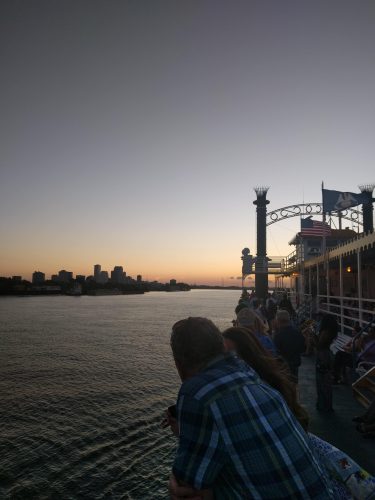This article is more than 5 years old.
I hadn’t been to New Orleans in several years, so it was fun to be back in the city!
I just want to share a few highlights from the programs I attended.
ALA this year for me was mostly about events and activities with the RUSA History Section. We started off with our all-committee meeting on Saturday morning, which was immediately followed by our program, “Region, Race, and Research: Perspectives from Local History.” We brought in three researchers who are working on projects around this theme in the New Orleans area. The first, William Horne, is a PhD candidate at George Washington University and editor of The Activist History Review. He presented some of the research from his dissertation about the insane asylum in New Orleans, and specifically, the reasons cited for putting women, people of color, and immigrants there. The second speaker, Christopher Harter, is one of the authors of a white paper on diversifying the digital historical record by partnering with community archives. He shared some of the particular challenges that local archives face, as well as what the authors learned through their experience working with these groups. The final speaker was Laura Kilcer, the curator at Oak Alley Plantation just outside of New Orleans. Her presentation was fascinating, as she shared how she moved from the traditional plantation nostalgia (women in hoop skirts, focus on the “big house” and its aesthetics, “Lost Cause” ideology) to research-based interpretation that explores all facets of plantation life, including slavery and the slaves who worked there. In order to do so, however, she had to reach out to library and archives all over Louisiana, since there were no historical records at the plantation. Many thanks to the program planners for their hard work on this program!
Another New Orleans history-related session was the Library History Round Table’s Holley Lecture, “Girl in a Frame: Enslaved People, their Stories, and Archives in the Digital Age,” presented by Mary Niall Mitchell, a history professor at the University of New Orleans. Her presentation focused on how anti-slavery groups used photos of formerly enslaved children to garner money and sympathy from northerners; however, this act did not encourage empathy for people of color. She shared dozens of photos and news clippings from her research for her new book on this topic (here’s an essay she wrote for the New York Times on the subject, if you’re interested). She is one of the primary people responsible for the website FreedomontheMove.org, a collaborative database of fugitive slave advertisements. The project just received some big grants, which is being used to redesign and enhance the metadata for the advertisements and the functionality of the site for researchers.
On the instruction side, I attended “Moving Beyond the Threshold: Next Steps in Critical IL,” which was sponsored by the Library Instruction Round Table (LIRT). Ian Beilin, one of the biggest proponents of CIL, encouraged librarians to keep in mind the original mission of CIL as we continue to move forward and to continually reflect on our practices. However, the most interesting speaker, for me, was Amita Lonial, a librarian at San Diego County Public Library, who shared her experience implementing CIL in library programming for adults. Her focus has been on creating participatory learning experiences that require people to talk to each other and engage in collaborative inquiry. She also shared some projects that have inspired her: The Uni Project, Allied Media Projects, Free Black Women’s Library, Digital Media and Learning Research Hub, Race Card Project, Letters to the Next President. She also shared resources, such as the Oakland Public Library Fake News workshops (includes a link to the Facilitator’s Guide) and the case studies provided in “Advancing Racial Equity in Public Libraries” from the Racial Equity Alliance. I’m interested to see how we might be able to incorporate some of these ideas here at ZSR.
In addition to programs, I got to connect and re-connect with some great colleagues from all over the country, eat LOTS of good food, and go on a riverboat cruise! Until next time, NOLA!


5 Comments on ‘Kathy S. @ ALA Annual in NOLA’
Kathy, thanks for this post and these links! I’m looking through the Oakland Public Library Fake News workshop now!
The thing I hate about ALA Annual is that it is so enormous that it’s impossible to attend all the interesting programs. Yours sound like they were wonderful!
“Region, Race, and Research: Perspectives from Local History” sounds amazing and I’m going to read Mitchell’s NYT piece, it’s always great to see programming that reflects the location of the conference. Thanks for sharing your experiences, Kathy!
Thanks for the write up and all of the links. This is helpful stuff!
I’m happy to hear that the RUSA program highlighted how the historical narrative of the South and plantation life is expanding to include slavery and the enslaved. It’s a tribute to libraries that Laura Kilcer had to rely on their archival holdings to fill the gaps in the plantation’s history, since the plantation itself didn’t have historical records.